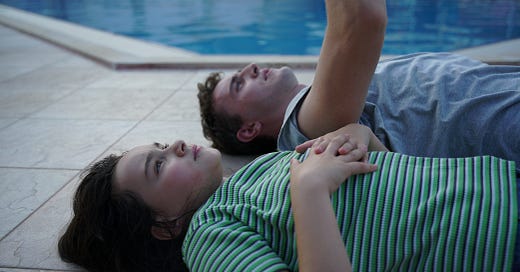Heartland: Aftersun
Charlotte Wells feature debut is a quiet, intimate, and emotional ode to the bond between father and daughter.
For Heartland Film Festival showtimes and tickets, click here.
The way we see things when we’re children versus how we look back at them once we’ve grown up has always been a concept that has proved ripe for the cinema. A24 has definitely established one of their niches in this area with movies like "The Florida Project," "C’mon C’mon," and "Room." Charlotte Wells’ feature debut "Aftersun" proves to be another perfect example of why this concept has continued to be so strong.
Set in the nineties, the film follows 11-year-old Sophie (Frankie Corio) as she goes on a weeklong trip to Turkey alongside her estranged young father, Calum (Paul Mescal). "Aftersun" is a film that isn’t based around an overarching plot. It moves at its own pace, using nonlinear storytelling and unconventional filming methods to execute its themes, and it’s not until about 45 minutes or so into the film that the audience gets a sense of the film’s true themes. Even when the credits roll, Wells leaves viewers with a lot to ponder long after leaving the theater.
What works so well with "Aftersun" is Wells' extremely personal and insightful vision for the film. Even when diving into more metaphorical elements, the film steers away from ever feeling pretentious or full of itself. Wells’ vision is ever-present throughout the duration of the film, and she clearly has a keen sense for storytelling and capturing the themes of this complex relationship between a father and his daughter. The film moves at a very relaxed pace, one that may turn off some viewers, and the film’s hour and a half runtime will likely be felt by many, but despite that, it all works beautifully in favor of the story.
Frankie Corio leaves a strong impression as Sophie. While there are times when child actors can feel artificial, there is nothing inauthentic with how Corio carries herself on the big screen. Her delivery, paired with Wells’ dialogue, feels raw, natural, and even unscripted. The way she carries herself, her conversations with Paul Mescal, and how she interacts with another young boy who remains glued to a motorcycle arcade game, or the group of young adults playing pool and drinking near the hotel bar, Corio makes the character of Sophie feel deeply human.
Paul Mescal gives a phenomenal performance as well in the role of Calum. The chemistry he shares with his younger co-star feels sweet but also heartbreaking. There are parts of the character of Calum that are shown visually but never addressed through dialogue, which Mescal handles with delicacy and a grounded and mature approach. Calum is clearly flawed as a father, but the depth he is given makes it very easy to feel empathy for him.
"Aftersun" isn’t a self-conscious film, even if the characters in the forefront can be at times. In fact, it feels like Wells is letting the audience into her own head and trying to get them to the same level. They don’t have to like the film itself, but simply understand her and what she’s trying to say. Even amongst the deeper themes of adolescence, denial, neglect, and unconditional love, "Aftersun" still has moments of levity. We really do see the love that Calum and Sophie have for one another, even in their lowest moments. Complex parental relationships are a hard thing to pull off in storytelling without it feeling too exaggerated or drowned in insincerity, but the script for "Aftersun" feels from the heart, truthful, and egoless.
Once the film reaches its conclusion, some may leave "Aftersun" feeling empty or as if it were a film that lacks a point. It also might leave some feeling alienated, and the lackadaisical pacing can prove a bit much at times, but for those who are patient, this is truly one of the most beautiful films of the year.





